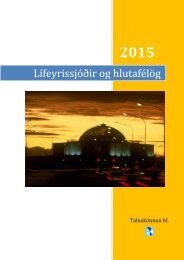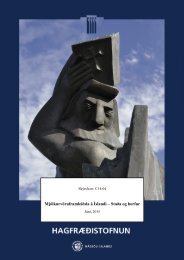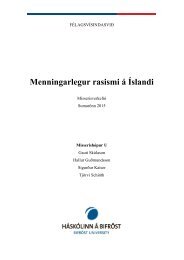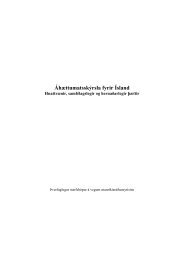You also want an ePaper? Increase the reach of your titles
YUMPU automatically turns print PDFs into web optimized ePapers that Google loves.
WORLD REPORT 2016<br />
HUMAN RIGHTS WATCH<br />
Also in November, two UN rapporteurs said the steps taken by the Brazilian government<br />
and two mining companies to prevent harm after the collapse of a tailing<br />
dam, which contained waste from mining operations, were “clearly<br />
insufficient.” The accident killed at least 15 people, left 4 people missing, and<br />
released toxic chemicals into the Doce River. Brazil’s government considers it<br />
the biggest environmental disaster in the country’s history.<br />
As a member of the UN Human Rights Council, Brazil was inconsistent, abstaining<br />
on a key resolution by the council on Syria in March, but voting in June to<br />
condemn Syrian human rights violations. Brazil abstained on a resolution to<br />
renew the mandate of the special rapporteur on Iran, who has denounced<br />
human rights violations there.<br />
Brazil continued to lead on privacy rights in the digital age, co-authoring with<br />
Germany a resolution approved unanimously by the Human Rights Council to appoint<br />
a special rapporteur to promote and protect the right to privacy worldwide.<br />
Brazil was also a sponsor of Human Rights Council resolutions condemning<br />
racism and highlighting the corrosive impact of institutional corruption on<br />
human rights.<br />
In May, Brazil endorsed the global Safe Schools Declaration, thereby committing<br />
to do more to protect students, teachers, and schools during times of armed<br />
conflict, including by implementing the Guidelines on Protecting Schools from<br />
Military Use. The 2014 guidelines were developed by representatives from 14<br />
countries as well as human rights and humanitarian organizations.<br />
The number of refugees admitted to Brazil has doubled over the past five years<br />
to a total of more than 8,400 in 2015, according to the Ministry of Justice. About<br />
a quarter of those admitted since 2011 have been Syrians. Brazil renewed a resolution<br />
that facilitated issuing humanitarian visas to Syrian citizens and developed<br />
new policies to better respond to the needs of refugees, especially for<br />
obtaining identity papers.<br />
Burma<br />
The transition from military to civilian rule in Burma that started in 2011 slowed<br />
down and reversed in some sectors in 2015. Despite a significantly improved environment<br />
for freedom of expression and media, in key areas the government’s<br />
commitment to improving its human rights faltered or failed. The landslide victory<br />
of the opposition National League for Democracy (NLD) in November elections,<br />
the first relatively open national elections in 25 years, seemed poised to<br />
reenergize reforms in some areas, but it was too early to gauge at time of writing.<br />
Elections<br />
Nationwide parliamentary elections were held on November 8, with 91 parties<br />
and hundreds of independent candidates contesting over 1,100 seats. The NLD<br />
won a majority of seats in both national houses of parliament and in regional<br />
and state assemblies, with more than 85 percent of seats.<br />
The Union Electoral Commission (UEC) lacked independence and impartiality in<br />
the lead-up to elections. Its chairman repeatedly said he hoped for victory by the<br />
military-backed ruling Union Solidarity and Development Party (USDP), and the<br />
commission itself issued guidelines prohibiting political parties from criticizing<br />
the military in policy platform speeches broadcast over state-controlled media.<br />
Due to changes in political party laws and enforcement of the draconian 1982<br />
Citizenship Law, the applications of more than 50 Muslim candidates were disallowed<br />
during candidate eligibility screening, including those of two sitting ruling<br />
party members of parliament who identify as Rohingya Muslims. Neither the<br />
USDP nor the NLD fielded a Muslim candidate anywhere in Burma, and no Muslim<br />
citizen was voted into parliament nationwide.<br />
The nationwide repeal of temporary citizenship cards (the so-called white cards)<br />
disenfranchised over 800,000 people who had previously been permitted to<br />
vote in the 2008 constitutional referendum and the 2010 elections, many of<br />
them Rohingya in Arakan State.<br />
Despite these serious defects, the two-month campaign was surprisingly open,<br />
with few reports of intimidation, violence, or irregularities. Party rallies were conducted<br />
peacefully throughout the country, and there were no significant curbs on<br />
136<br />
137










